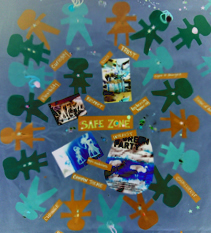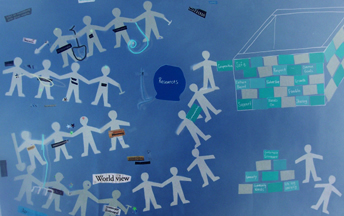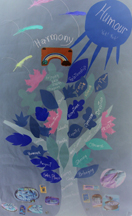Here
you will read about how we did our research.
To read more, click here or download the PDF - 440kb.
In this project, we took an ethnographic approach to
research. That
is, we became engaged with learning circles, familiarized ourselves
with how they work, listened to the participants talking about them,
became part of their world as much as we could, wrote about them out
of this experience of engagement and listening.
Our writing took place in several stages. First,
we wrote narratives about the learning circles. Then we wrote analysis pieces, focused
on aspects of learning circles that seemed particularly important to
us. You can find these analysis pieces on this website by going
to values and practices of learning circles.
This writing became the basis for discussion among
the Researchers and the Lifelong Learning Working Group. The discussion was long and
complex, continuing as the Researchers continued to meet with learning
circles and learn about them. This discussion deepened the analysis
and lead to new ways of understanding the learning circles as we met
with them. This, in turn, led to new questions to explore with
the learning circles and among the Researchers. We Researchers
began to see ourselves as a learning circle in our own right. And
we were also part of a larger learning circle, the Lifelong Learning
Working Group, which had begun the discussion about inclusive lifelong
learning, and which continued to help us to understand the significance
of what we were seeing in the research.
In the last year of the project, we brought more people
into the process of analysis-through-discussion at a symposium. The symposium brought
together sixteen participants representing three rural learning circles,
two Indigenous learning circles and four urban learning circles. This
group also included members of the Working Group, the Researchers, a
staff person from the Federation of Women’s Institutes of Ontario
and faculty and researchers from the Centre for Aboriginal and Indigenous
Studies at the Ontario Institute for Studies in Education of the
University of Toronto.
In this project, our beliefs about research have been clarified. We
know that an ethnographic approach to research can be used effectively
by adult educators, in this case literacy workers, who are not trained
as researchers. We know that analysis can be developed collaboratively,
through discussion. We also know that this discussion can be
extended beyond the research group to the participants in the study,
by applying the inclusive practices that we observed in the learning
circles.















 National
Literacy Secretariat
National
Literacy Secretariat 

 NALD
NALD